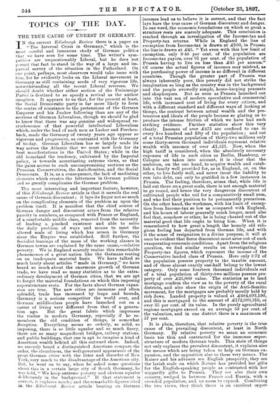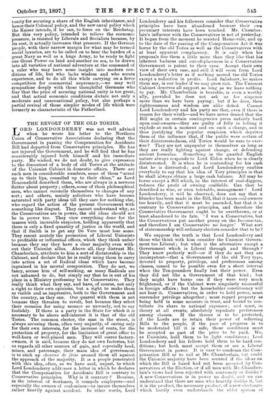TOPICS OF THE DAY.
THE TRUE CAUSE OF UNREST IN GERMANY.
IN the current Edinburgh Review there is a paper on "The Internal Crisis in Germany," which is the most careful and luminous study of German politics that we have seen for some time. The writer's sym- pathies are unquestionably Liberal, but he does not p.-rmit that fact to stand in the way of a large and im- partial survey of the situation in the Fatherland. On one point, perhaps, most observers would take issue with him, for he evidently looks on the Liberal movement in Germany as still containing seeds of very vigorous life, notwithstanding all the recent Liberal reverses. We should doubt whether either section of the Freisinnige Partei is destined to so speedy a revival as the author imagines. It appears to us that, for the present at least, the Social Democratic party is far more likely to form the centre of resistance to the pretensions of the German Emperor and his Junker following than are any of the sections of German Liberalism, though we should be glad to know that there was any genuine and widespread re- crudescence of that powerful intellectual Liberalism which, under the lead of such men as Lasker and Forchen- beck, made the Germany of twenty years ago appear so vigorous and progressive as contrasted with the Germany of to-day. German Liberalism has so largely made its way across the Atlantic that we must now look for its best manifestations in the United States ; while in the old homeland the tendency, cultivated by the Imperial policy, is towards accentuating extreme views, so that the gains accrue to such uncompromising sections as the Prussian Conservatives, the Anti-Semites, and the Social Democrats. It is, as a consequence, the lack of mediating elements which creates the bitterness in German politics ,.nd so greatly complicates the German problem.
The most interesting and important feature, however, of this Edinburgh Review article is that it unveils the real cause of German discontent ; it lays its finger not so much on the complicating elements of the problem as upon the problem itself. It is manifest that the chief source of German danger and discontent arises from the relative paucity in numbers, as compared with France or England, of a comfortable middle class, removed from the necessity of leading a pinched existence and able to solve the daily problem of ways and means to meet the altered scale of living which has arisen in Germany since the Empire was established. Still further, the Socialist leanings of the mass of the working classes in German towns are explained by the same cause,—relative poverty. We in England scarcely realise this remarkable phenomenon of a great nation like the Germans resting on an inadequate material basis. We have talked so much lately about articles "made in Germany," we have heard so much about the enormous growth of German trade, we have read so many statistics as to the extra- ordinary development of German cities, that we are apt to forget the material foundations on which this imposing superstructure rests. For the facts about German expan- sion are true. The new cities are immense and often splendid, trade has increased by leaps and bounds, Germany is a serious competitor the world over, and German middle-class people have launched out on a career of living very different from that of a genera- tion ago. But the great fabric which impresses the visitor in modern Germany, especially if he re- members the old condition of things, is somewhat deceptive. Everything seems so orderly, so solid, so imposing, there is so little squalor and so much finery, there are so many magnificent bridges, railway stations, and public buildings, that one is apt to imagine a kind of American wealth behind all this outward show. Indeed, we recently heard a distinguished American compare the order, the cleanliness, the well-governed appearance of the great German cities with the litter and disorder of New York, very much to the disadvantage of the American city. But, he went on to say, when be asked some questions about this in a certain large city of South Germany, he was told, "We keep extreme poverty and obvious squalor deliberately in the background." If that statement is correct, it explains much ; and the remarkable figures cited in the Edinburgh Review article bearing on German incomes lead us to believe it is correct, and that the fact lays bare the true cause of German discontent and danger. In one word, the economic foundations on which so great a. structure rests are scarcely adequate. This conclusion is. reached through an investigation of the Income-tax and Property-tax returns. While in England the line of exemption from Income-tax is drawn at £160, in Prussia the line is drawn at £45. "Yet even with this low limit of exemption, only 8-46 per cent. of the population are Income-tax payers, over 91 per cent. of the population of Prussia having to live on less than £45 per annum." Of course the actual figures of incomes may mislead, as the purchasing power of income is so different in different countries. Though the greater part of Prussia was always inherently poor, this poverty did not strike the imagination so long as the country was in the background and the people avowedly simple, home-keeping peasants and shopkeepers. But as soon as Prussia launched out into the vast sea of modern speculative and commercial life, with increased cost of living for every citizen, and with a different standard and different ways of looking at things, the contrast between actual wealth and the pre- tensions and ideals of the people became so glaring as to produce the intense friction of which we have had such striking evidence. Further statistics show this very clearly. Incomes of over £475 are confined to one in every five hundred and fifty of the population ; and out of a total Prussian population of thirty-two millions only some thirty-seven thousand individuals represent relative wealth with incomes of over £1,525. Now, when the high tariff is considered, when the absolutely necessary expenses of life in such cities as Berlin, Hamburg, or Cologne are taken into account, it is clear that the ambition, on the one hand, to acquire wealth and estab- lish a family well provided for, as in England, or, on the other, to live fairly well, and never incur the liability to run into debt, can only be gratified in a few instances in Prussia. The feeling, therefore, arises that, while life is laid out there on a great scale, there is not enough material to go round, and hence the very dangerous discontent of cultivated people who toil for a comparatively small sum, and who feel their position to be permanently precarious. On the other hand, the workman, with his limit of exemp- tion from Income-tax so low as compared with England, and his hours of labour generally much longer, must also feel that, somehow or other, he is being cheated out of the material good that life ought to bring him. When it is remembered to how great a length the homely old reli- gious feeling has departed from German life, and with it the sense of resignation to a divine purpose, it will at once be evident that fierce discontent must arise out of such exasperating economic conditions. Apart from the religious, question, we find similar results on investigating the Property-tax figures, which represent the income of the Conservative landed class of Prussia. Here only 3.72 of the population possess property to the taxable amount, and of these almost exactly one-half belong to the lowest category. Only some fourteen thousand individuals out of a total population of thirty-two millions possess pro- perty of over £25,000 value. The statistics as to land. mortgage confirm the view as to the poverty of the rural districts, and also show the origin of the Anti-Semitic movement, for the mortgages are probably mostly held by- rich Jews. Landed property is valued at £484,693,190, and this is mortgaged to the amount of £172,093,310, or over 35 per cent. of its value. In the purely agricultural regions mortgages exceed on an average 50 per cent. of the valuation, and in one district there is a maximum of 57 per cent.
It is plain, therefore, that relative poverty is the true cause of the prevailing discontent, at least in North Germany. By relative poverty we mean an economic basis too thin and contracted for the immense super- structure of modern German trade. This state of things not only explains the prevalent discontent, it explains also the means which are being taken to help on German ex- pansion, and the opposition also to these very means. The Kaiser and his advisers see English prosperity, they see the lavish scale on which Nature has provided her gifts for the English-speaking people as contrasted with her niggardly gifts to Prussia. They see also their own country, wedged in between France and Russia, with a crowded population, and no room to expand. Combining the two views, they think there is an excellent copper- tunity for securing a share of the English inheritance, and hence their Colonial policy, and the new naval policy which the Kaiser intends, if he can, to force on the Reichstag. But this very policy, intended to relieve the economic pressure, is resisted by Liberals and Socialists because, by its cost, it actually increases that pressure. If the German people, with their narrow margin for what may be termed social luxuries, are to be called on to bear the burden of a great Navy as well as a huge Army, to be ready to fight one Great Power on land and another on sea, to be drawn into all varieties of national adventure at the command of a ruler who may have some insight into modern con- ditions of life, but who lacks wisdom and who scouts experience, and to do all this while carrying on a fierce competition for commercial supremacy,—we may well sympathise deeply with those thoughtful Germans who fear that the price of securing national unity is too great, and that actual economic conditions dictate not only a moderate and unsensational policy, but also perhaps a partial revival of those simpler modes of life which were formerly so characteristic of the Fatherland.











































 Previous page
Previous page